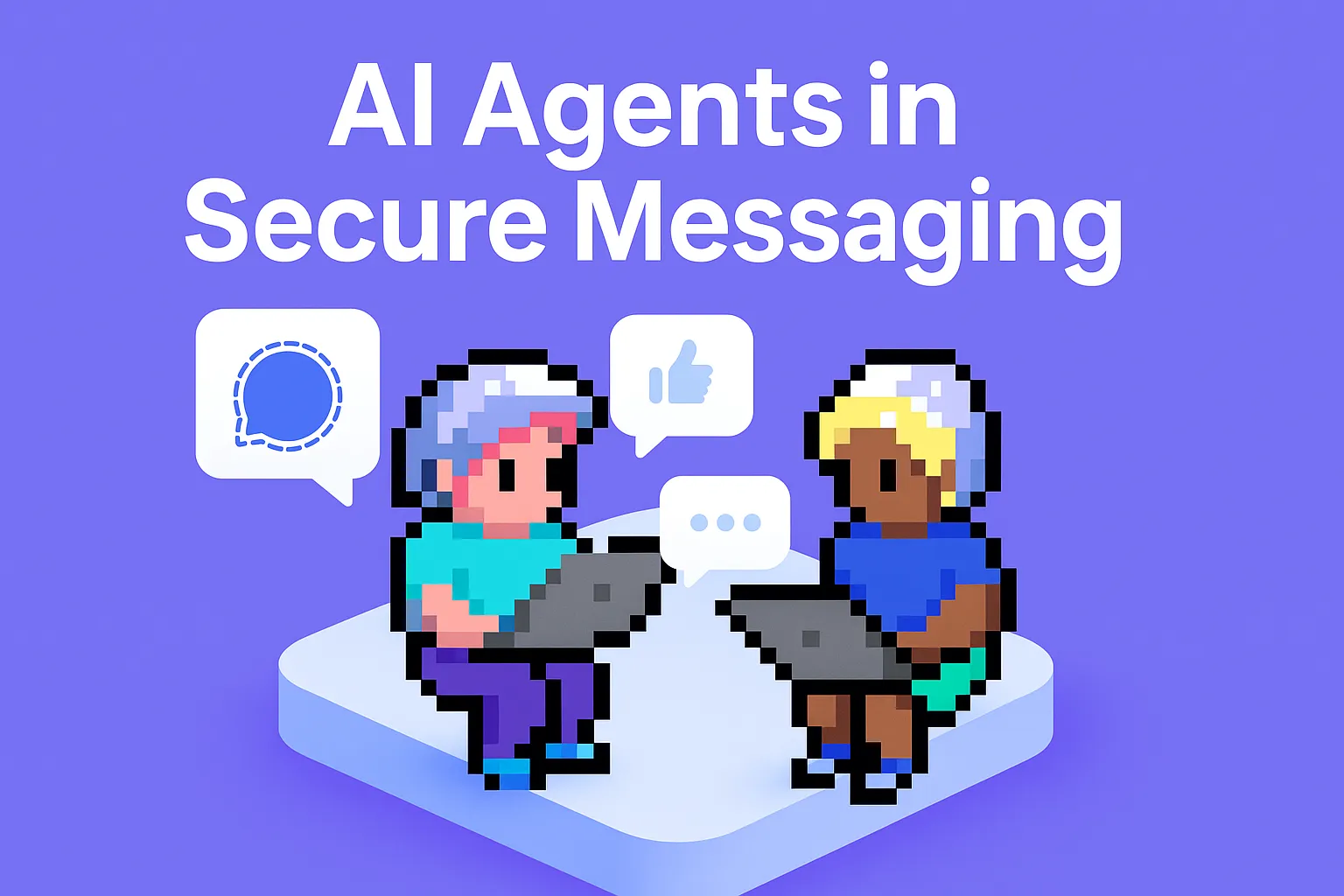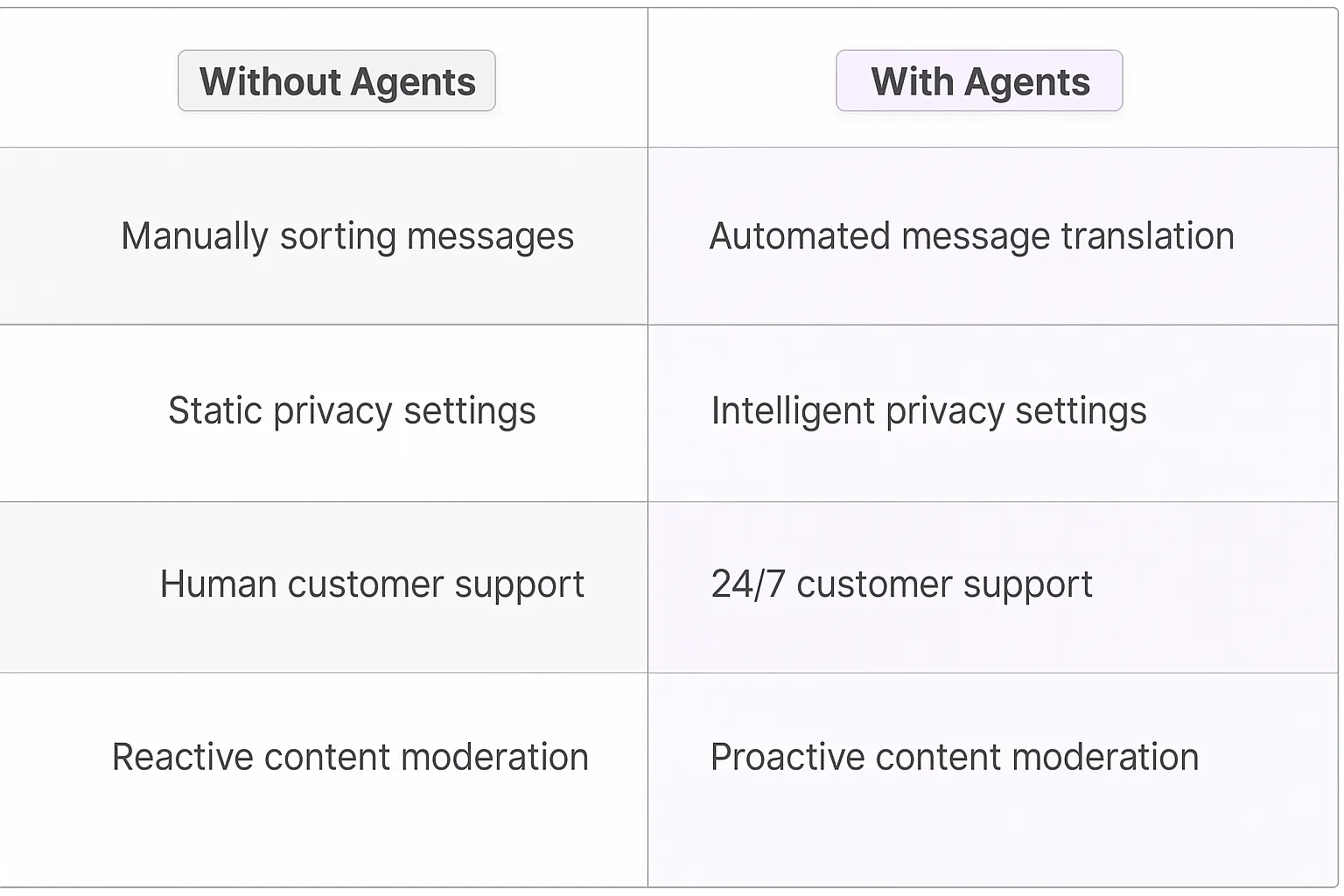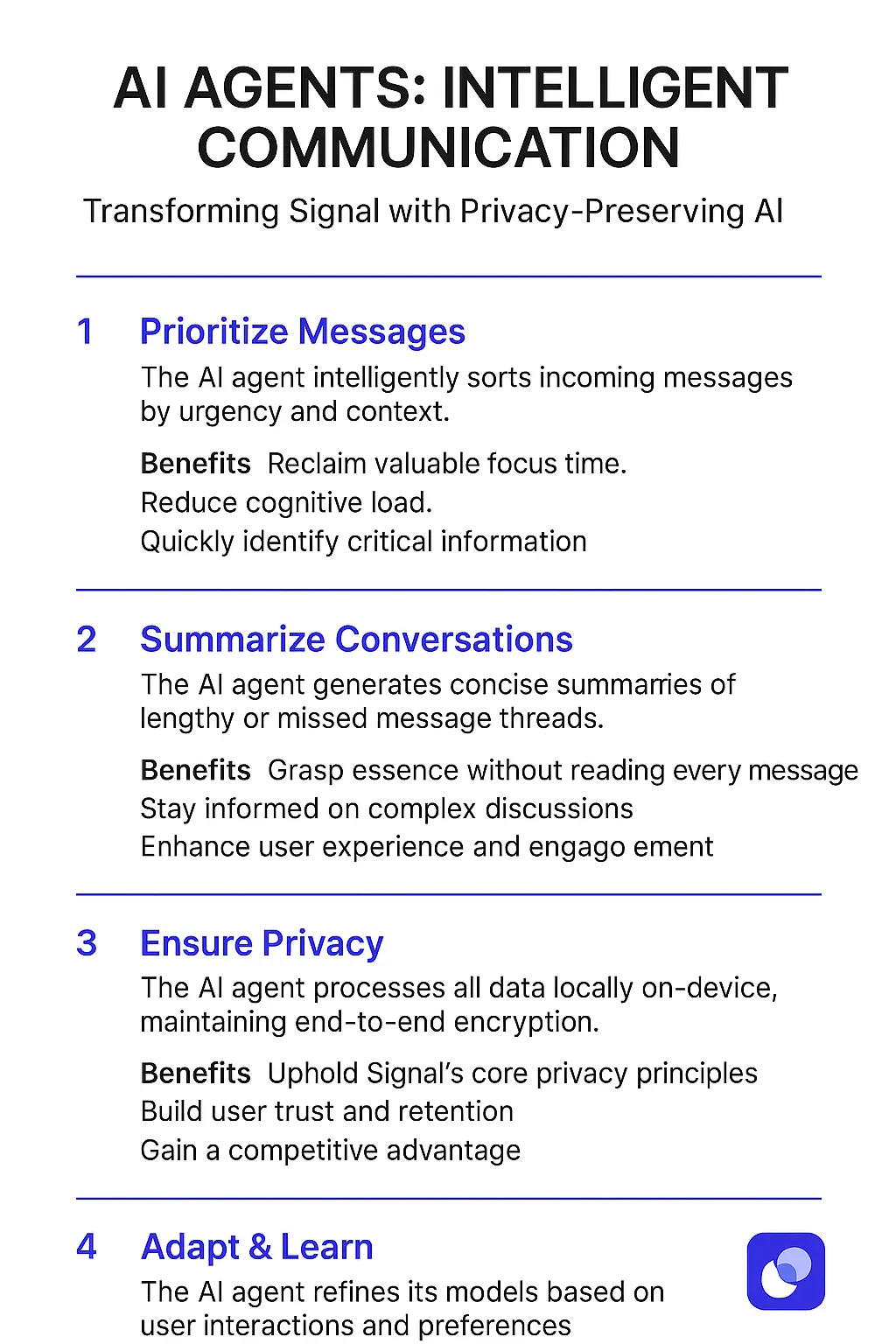Signal AI Agents
Understanding Signal
Signal is a privacy-focused messaging app that's gained a reputation as the gold standard for secure communication. It uses end-to-end encryption to ensure that only the sender and recipient can read messages, making it a go-to choice for privacy-conscious users, journalists, and even government officials. Signal's commitment to user privacy and open-source development has set it apart in a crowded messaging app market.
Signal's standout features include:1. End-to-end encryption for all communications2. Self-destructing messages3. Screen security to prevent screenshots4. Encrypted group calls5. Local storage of messages and contacts6. Open-source code for transparency7. Minimal data collection, enhancing user privacy

Benefits of AI Agents for Signal
Let's dive into the world of AI agents and how they're reshaping the landscape of secure messaging apps like Signal. As someone who's been in the trenches of tech startups and venture capital, I've seen firsthand how AI is not just a buzzword, but a game-changer when implemented thoughtfully.
What would have been used before AI Agents?
Before AI agents entered the chat (pun intended), Signal users relied on static features and manual processes. Think about it: you had to manually sort through messages, set reminders, and manage your privacy settings. It was like trying to navigate a bustling city without GPS – doable, but not exactly efficient.
Customer support? That was all human-powered, with response times that could stretch longer than a San Francisco brunch line on a Sunday morning. And let's not even get started on content moderation – it was a Herculean task that often fell short, leaving users vulnerable to spam and inappropriate content.
What are the benefits of AI Agents?
Now, with AI agents in the mix, Signal is leveling up in ways that would make even the most jaded tech enthusiast sit up and take notice. These digital teammates are like having a hyper-intelligent, tireless assistant that's always on call.
First off, message management becomes a breeze. AI agents can prioritize your conversations, suggesting which threads need your immediate attention. They can even draft quick replies based on your communication style, saving you precious time – and we all know time is the ultimate currency in tech.
Privacy and security, Signal's bread and butter, get a significant boost. AI agents can continuously monitor for potential security threats, adapting encryption protocols in real-time. They're like digital bodyguards, always on the lookout for anything suspicious.
But here's where it gets really interesting: personalization. AI agents learn your preferences over time, tailoring the Signal experience to your needs. They might suggest optimal times to send messages for maximum engagement or provide insights on your communication patterns. It's like having a personal communication coach in your pocket.
For Signal's team, AI agents are transforming customer support. They can handle routine queries 24/7, freeing up human agents to tackle more complex issues. This isn't just about cost-saving – it's about scaling personalized support in a way that was previously impossible.
Content moderation, once a never-ending game of whack-a-mole, becomes proactive rather than reactive. AI agents can identify and flag potentially problematic content before it even reaches users, creating a safer environment without compromising on the privacy that Signal users value.
The real kicker? All of this happens while maintaining Signal's commitment to end-to-end encryption and user privacy. It's a delicate balance, but one that AI agents are uniquely positioned to maintain.
In the end, AI agents aren't just adding features to Signal – they're fundamentally changing how we think about secure communication. They're turning Signal from a tool into a true digital companion, one that understands and anticipates our needs. And in the fast-paced world of tech, that kind of evolution isn't just nice to have – it's essential for staying ahead of the curve.

Potential Use Cases of AI Agents with Signal
Processes
Signal, the privacy-focused messaging app, could leverage AI agents to enhance user experience while maintaining its core commitment to security. These digital teammates could revolutionize how we interact with messaging platforms, adding layers of functionality without compromising on Signal's ethos.
One intriguing process AI agents could facilitate is automated message translation. As Signal users communicate across language barriers, an AI agent could seamlessly translate messages in real-time, preserving the nuances of the original text. This would expand Signal's global reach, making it an even more powerful tool for international communication.
Another process ripe for AI integration is content moderation. While Signal's end-to-end encryption makes traditional moderation challenging, AI agents could work on the client-side to flag potentially harmful content, giving users more control over their experience without compromising privacy.
Tasks
AI agents could tackle a variety of tasks within the Signal ecosystem, enhancing productivity and user engagement. One such task could be intelligent message scheduling. An AI agent could analyze a user's messaging patterns and suggest optimal times to send messages, ensuring they're read when the recipient is most likely to be available.
Another task AI agents could excel at is smart reply suggestions. By learning from a user's communication style and frequently used phrases, the AI could offer contextually relevant quick replies, speeding up conversations while maintaining a personal touch.
AI agents could also handle the task of content summarization. For users in group chats or those returning after a period of absence, an AI could provide concise summaries of missed conversations, helping users quickly catch up without scrolling through hundreds of messages.
The Signal AI Agent Revolution: A Tech Insider's Take
Signal's potential integration of AI agents is not just another tech gimmick – it's a paradigm shift in how we approach secure messaging. As someone who's seen countless startups come and go, I can tell you that this move could be a game-changer for Signal.
Think about it: Signal has always been the go-to for privacy-conscious users. But with AI agents, they're not just protecting your messages; they're amplifying your ability to communicate effectively. It's like giving every user a personal communications expert, right in their pocket.
The beauty of this approach is that it doesn't compromise Signal's core value proposition. These AI agents work client-side, meaning all the magic happens on your device. Your data stays yours, but you get the benefits of cutting-edge AI. It's a win-win that could set a new standard for how we think about privacy and functionality in tech.
But here's the kicker: this isn't just about making messaging easier. It's about creating a new platform for innovation. Once Signal opens up this AI capability, we could see a whole ecosystem of privacy-preserving AI applications emerge. Developers could create specialized agents for different use cases, all operating within Signal's secure environment.
This move could position Signal not just as a messaging app, but as the foundation for a new generation of privacy-first, AI-powered communication tools. It's the kind of bold step that separates the unicorns from the also-rans in the tech world.
In the end, Signal's exploration of AI agents isn't just about keeping up with the Joneses. It's about redefining what's possible in secure communication. And for those of us watching the tech landscape, it's a development that's definitely worth keeping an eye on.

Industry Use Cases for Signal AI Agents
Signal AI agents are reshaping how businesses operate across sectors. These digital teammates aren't just fancy chatbots - they're powerful tools that can transform core processes. Let's dive into some concrete examples of how different industries are leveraging Signal AI to gain a competitive edge.
From finance to healthcare, Signal AI agents are proving their worth by tackling complex tasks, analyzing vast datasets, and providing actionable insights. They're not replacing human workers, but rather augmenting their capabilities, allowing teams to focus on high-value activities that truly move the needle.
In the following sections, we'll explore how specific industries are harnessing the power of Signal AI agents to solve real-world problems, boost productivity, and drive innovation. These aren't hypothetical scenarios - they're based on actual implementations that are yielding tangible results for forward-thinking companies.
Fintech Disruption: Signal AI Agents Redefine Risk Assessment
The fintech industry is ripe for a shake-up, and Signal AI Agents are poised to be the catalyst. Let's dive into how these digital teammates could transform risk assessment in lending.
Traditional credit scoring models are like using a map from the 1990s to navigate today's financial landscape. They're outdated, inflexible, and often miss the nuances of modern financial behavior. Enter Signal AI Agents – the GPS of credit assessment.
These AI-powered allies can tap into a vast array of real-time data sources: social media activity, spending patterns, gig economy income, and even IoT device usage. They're not just looking at numbers; they're analyzing behavior, context, and trends that human analysts might miss.
Imagine a Signal AI Agent that can detect when a loan applicant's spending habits suddenly shift, indicating a potential job loss or financial stress. Or one that recognizes when a small business owner's social media engagement spikes, suggesting an uptick in customer interest and potential revenue growth.
But here's where it gets really interesting: these digital teammates can adapt and learn in real-time. They're not static models; they're dynamic, evolving systems that can quickly adjust to market changes, economic shifts, or even global events that impact financial risk.
The result? More accurate risk assessments, faster loan approvals, and potentially, a whole new category of creditworthy individuals who were previously overlooked by traditional models. It's not just about making existing processes more efficient; it's about fundamentally reimagining how we evaluate financial risk.
For fintech startups, leveraging Signal AI Agents could be the differentiator that allows them to outmaneuver established players. It's a classic example of using technology to create a step-function improvement in a critical business process.
The implications are massive. We could see a surge in financial inclusion, more personalized financial products, and a shift in how we think about creditworthiness. It's not just evolution; it's a revolution in risk assessment, powered by AI.
Healthcare Transformation: Signal AI Agents Redefine Patient Care
The healthcare industry is on the cusp of a major shift, and Signal AI Agents are the secret weapon that could finally crack the code of personalized medicine. This isn't just about making doctors' lives easier - it's about fundamentally changing how we approach patient care.
Think about the current state of healthcare. We've got electronic health records, sure, but they're often siloed, incomplete, and frankly, a pain for doctors to use. Signal AI Agents could be the bridge that connects all these disparate data points into a cohesive, actionable narrative of a patient's health.
These digital teammates could ingest and analyze data from wearables, genetic tests, environmental sensors, and even social determinants of health. They're not just looking at lab results; they're piecing together a holistic view of a patient's life and how it impacts their health.
A Signal AI Agent might notice that a patient's sleep patterns have changed, correlating with increased stress levels and subtle changes in their blood work. It could flag this to the doctor before the patient even realizes something's wrong. That's not just reactive healthcare; it's predictive and preventative.
But here's where it gets really interesting: these AI agents could learn and adapt based on population-level data while still maintaining individual privacy. They could identify trends and patterns that humans simply can't see, potentially uncovering new links between lifestyle factors and disease outcomes.
For startups in the healthtech space, this is a massive opportunity. The first companies to effectively deploy Signal AI Agents in healthcare could create a moat that's hard for competitors to cross. It's not just about having the technology; it's about building the trust and integration with healthcare systems to make it work.
We're talking about a potential shift from episodic care to continuous health management. From generalized treatment plans to hyper-personalized interventions. It's a complete reimagining of the doctor-patient relationship, with AI as the enabler of more human, not less human, interactions.
The implications go beyond individual health. We could see more efficient allocation of healthcare resources, earlier detection of public health threats, and potentially, a shift in how we approach clinical trials and drug development.
This isn't just an incremental improvement. It's a step-change in how we approach healthcare, driven by AI. And for the startups that get it right, the potential impact - both in terms of lives improved and market value created - is enormous.
Considerations and Challenges for Signal AI Agent Implementation
Implementing AI agents in Signal isn't just about plugging in some code and watching the magic happen. It's a complex dance of technology, user experience, and operational finesse. Let's dive into the nitty-gritty.
Technical Challenges
First up, we're dealing with Signal's end-to-end encryption. It's great for privacy, but it's like trying to teach a robot to dance while blindfolded. The AI needs to work within these encrypted constraints, which means either running locally on devices (hello, resource constraints!) or finding clever ways to process data without compromising security.
Then there's the issue of model size and performance. We're talking about squeezing a brain into a smartphone. Optimizing AI models for mobile devices is like trying to fit an elephant into a Mini Cooper – possible, but requires some serious engineering gymnastics.
Operational Challenges
On the ops side, we're looking at a whole new world of complexity. Maintaining and updating AI models across millions of devices is like herding cats – if those cats were constantly changing and lived inside encrypted boxes.
User privacy is another beast. Signal users expect Fort Knox-level security. Introducing AI without compromising this trust is like walking a tightrope over a volcano. One misstep, and you're in hot lava.
User Experience Considerations
Let's not forget the humans in this equation. Signal's UI is known for its simplicity. Integrating AI features without cluttering the interface is like performing surgery with oven mitts on – tricky, to say the least.
There's also the learning curve. Users need to understand what the AI can (and can't) do. It's not just about adding features; it's about educating users without overwhelming them. Think of it as teaching your grandma to use a smartphone, but the smartphone is constantly evolving.
Ethical Implications
We can't ignore the ethical elephant in the room. AI in messaging apps raises questions about data use, potential biases, and the blurring line between human and machine communication. It's like opening Pandora's box, but instead of mythical evils, we're dealing with very real concerns about privacy, autonomy, and the nature of digital interaction.
Implementing AI agents in Signal is no walk in the park. It's more like an obstacle course designed by a mad scientist. But for those who can navigate these challenges, the potential to enhance secure communication is enormous. Just remember, in the world of encrypted messaging, even your AI needs to learn to whisper.
The Future of Secure, Intelligent Communication
The integration of AI agents into Signal represents a pivotal moment in the evolution of secure messaging. It's not just about adding fancy features; it's about reimagining what's possible within the constraints of privacy-first communication. The potential benefits are immense: from enhanced user experience to more efficient operations, AI agents could transform Signal from a simple messaging app into a powerful, intelligent communication platform.
However, the road ahead is fraught with challenges. Balancing AI capabilities with Signal's unwavering commitment to privacy and security is no small feat. It requires innovative technical solutions, careful UX design, and a deep understanding of user expectations. The ethical implications of AI in secure messaging also can't be ignored.
Despite these hurdles, the potential payoff is huge. If Signal can successfully navigate this integration, it could set a new standard for secure, intelligent communication. It's a high-stakes game, but one that could redefine how we think about privacy, security, and AI in our digital interactions. For Signal, and for the tech industry as a whole, this is a space to watch closely. The future of secure communication might just be AI-powered, and Signal could be leading the charge.













